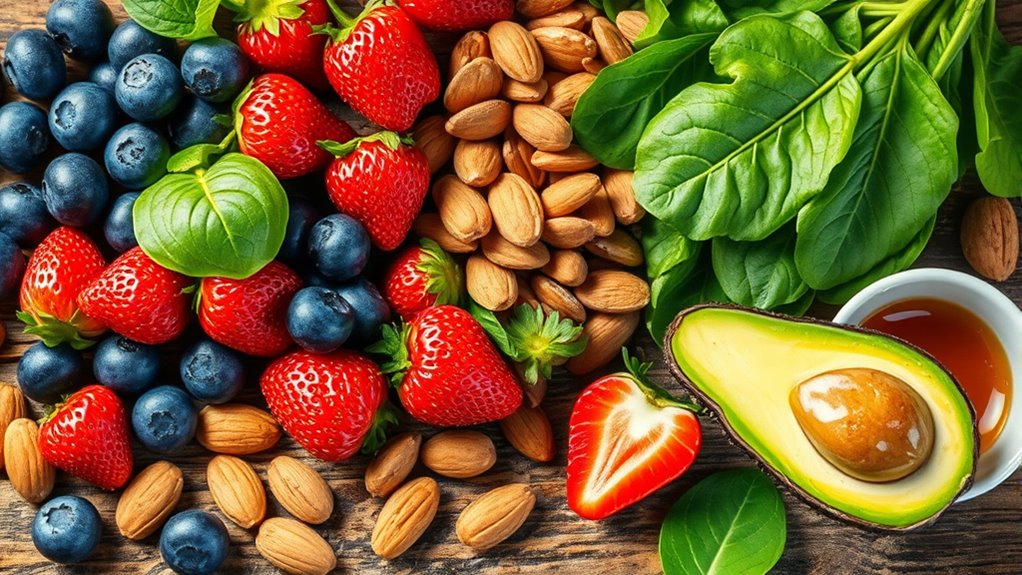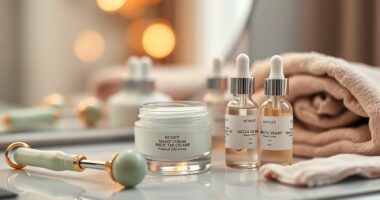To combat signs of aging in midlife, focus on foods that boost collagen and combat oxidative stress. Incorporate citrus fruits, berries, leafy greens, and colorful vegetables for their vitamin C and antioxidant levels. Eat lean proteins, eggs, and fatty fish like salmon to supply essential amino acids and omega-3s that support skin elasticity. Don’t forget nuts, seeds, and whole grains for zinc and hydration. Keep exploring to discover more tips for keeping your skin youthful and firm.
Key Takeaways
- Incorporate vitamin C-rich foods like citrus, strawberries, and bell peppers to boost collagen production and protect against oxidative damage.
- Consume lean proteins, eggs, and omega-3 fatty acids from fatty fish to support skin elasticity and reduce inflammation.
- Eat colorful vegetables and berries such as spinach, kale, and sweet potatoes for antioxidants that fight skin aging.
- Stay well-hydrated and include zinc-rich foods like nuts and seeds to support skin repair and collagen synthesis.
- Maintain a balanced diet with phytochemicals and nutrients that promote skin resilience and combat visible signs of aging.

As you age, your diet can play a essential role in maintaining your youthful vitality and overall health. One of the most noticeable signs of aging is changes in your skin, such as reduced firmness and the development of fine lines. You might notice your skin losing its elasticity, which can make you appear older than you feel. To combat these effects, focusing on foods that support skin elasticity and collagen production can make a significant difference. Collagen, a crucial protein in your skin, helps keep it firm and plump. As you age, your body’s natural collagen production declines, leading to sagging skin and wrinkles. Including foods rich in specific nutrients can help stimulate collagen synthesis and preserve your skin’s youthful appearance.
Supporting collagen production through diet helps maintain youthful, resilient skin as you age.
Foods high in vitamin C are essential because they act as powerful antioxidants and are vital for collagen synthesis. Citrus fruits like oranges, grapefruits, and lemons are excellent choices, as are strawberries, bell peppers, and kiwi. These fruits help protect your skin from free radical damage, which accelerates aging and damages collagen fibers. Incorporating these into your daily diet can boost your body’s ability to produce new collagen, maintaining your skin’s firmness and elasticity longer.
Protein-rich foods also play a critical role in supporting collagen production. Lean meats, eggs, fish, and plant-based sources like beans and lentils supply amino acids, which are the building blocks for collagen. Omega-3 fatty acids found in fatty fish like salmon, mackerel, and sardines are particularly beneficial. They help reduce inflammation and support skin cell regeneration, contributing to better skin elasticity and overall skin health. Including these foods regularly ensures your body has the necessary nutrients to maintain collagen levels and fight off the visible signs of aging.
Antioxidants found in colorful vegetables and fruits are equally important. Berries, spinach, kale, and sweet potatoes contain vitamins and phytochemicals that protect your skin from oxidative stress, a major factor in skin aging. By reducing inflammation and shielding your skin from environmental damage, these foods help preserve collagen fibers and keep your skin resilient.
Finally, staying hydrated and including foods rich in zinc, like nuts, seeds, and whole grains, supports skin repair and collagen synthesis. Proper hydration maintains skin moisture and suppleness, complementing the effects of nutrient-rich foods. When you combine a balanced diet with these anti-aging foods, you’re actively supporting your skin’s structure, helping it stay firm, elastic, and youthful for longer.
Frequently Asked Questions
Can Anti-Aging Foods Reverse Existing Wrinkles?
While anti-aging foods can support your skin’s health, they can’t fully reverse existing wrinkles. By including nutrient-rich foods, you may improve skin elasticity and promote collagen production, which helps reduce the appearance of new lines. Eating foods high in antioxidants and vitamins encourages wrinkle reduction over time. However, for significant wrinkle reduction, you might also consider skincare treatments alongside a healthy diet.
Are Supplements Necessary if I Eat These Foods Regularly?
Imagine your body’s garden flourishing with vibrant, nourishing foods. If you eat these regularly, supplement necessity becomes less clear, as your body can absorb nutrients effectively. However, individual needs vary, and sometimes supplements help fill gaps in nutrient absorption. You might not need them daily, but consulting with a healthcare professional guarantees you’re giving your body what it truly needs for healthy aging.
How Much of These Foods Should I Consume Daily?
When considering your daily intake guidelines, you should aim for balanced portions of these foods without overeating. Typically, a serving size like a handful of nuts or a cup of berries is sufficient. Use portion control tips such as measuring portions or filling half your plate with fruits and vegetables. This way, you get the benefits without excess calories, supporting healthy aging and overall well-being.
Do These Foods Help With Energy Levels or Only Skin Health?
These foods do more than just improve skin health; they also give you an energy boost and support your overall vigor. When you include nutrient-rich options like berries, nuts, and leafy greens in your diet, you’ll notice increased stamina and mental clarity. They help fuel your body, fight fatigue, and keep you feeling lively throughout the day. So, yes, these foods benefit both your energy levels and your youthful appearance.
Are There Any Side Effects From Eating Large Amounts of These Foods?
Did you know that over 32 million Americans suffer from food allergies? Eating large amounts of healthy anti-aging foods can sometimes cause side effects, like nutrient overdose or triggering food allergies. You should be cautious, as excessive intake may lead to digestive issues or allergic reactions. Always balance your diet and consult a healthcare professional to avoid potential risks associated with consuming too much of these nutrient-rich foods.
Conclusion
As you embrace these anti-aging foods, you’re planting seeds of vitality that bloom with every bite. Think of them as your personal fountain of youth, turning back the clock with nature’s finest ingredients. By nourishing your body with these age-defying treasures, you’re sculpting a resilient, radiant version of yourself—like a timeless masterpiece in progress. So, savor each meal, and let your journey to agelessness be as vibrant and enduring as a sunrise.









